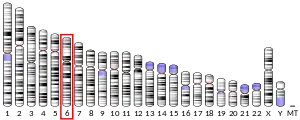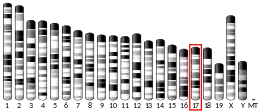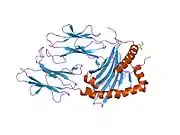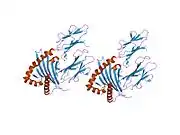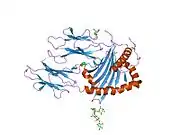Major histocompatibility complex, class II, DQ alpha 1, also known as HLA-DQA1, is a human gene present on short arm of chromosome 6 (6p21.3) and also denotes the genetic locus which contains this gene.[5] The protein encoded by this gene is one of two proteins that are required to form the DQ heterodimer, a cell surface receptor essential to the function of the immune system.
Function
HLA-DQA1 belongs to the HLA class II alpha chain paralogues. This class II molecule is a heterodimer consisting of an alpha (DQA) and a beta chain (DQB), both anchored in the membrane. It plays a central role in the immune system by presenting peptides derived from extracellular proteins. Class II molecules are expressed in antigen-presenting cells (APC: B lymphocytes, dendritic cells, macrophages).[5]
Gene structure and polymorphisms
The alpha chain contains 5 exons. Exon one encodes the leader peptide, exons 2 and 3 encode the two extracellular protein domains, exon 4 encodes the transmembrane domain and the cytoplasmic tail. Within the DQ molecule both the alpha chain and the beta chain contain the polymorphisms specifying the peptide binding specificities, resulting in up to 4 different molecules. Typing for these polymorphisms is routinely done for bone marrow transplantation.[5][6]
Alleles
DQ1
There are four commonly encountered DQA1 alleles: DQA1*0101, *0102, *0103, *0104. These alleles are always found in haplotypes with HLA-DQB1*05 (DQ5) and HLA-DQB1*06 (DQ6). DQ1 is a serotype, rare among serotypes for human class II antigens, in that the antibodies to DQ1 react to the alpha chain of HLA DQ, these DQA1 allele gene products.
| DQA1 | linked DQB1 allele | ||||||
|---|---|---|---|---|---|---|---|
| DQ1 | *0101 | *0501 | *0301 | ||||
| *0102 | *0502 | *0504 | *0602 | *0604 | *0605 | *0609 | |
| *0103 | *0501 | *0502 | *0601 | *0602 | *0603 | ||
| *0104 | *0501 | *0503 | *0602 | ||||
| *0105 | rare | ||||||
| *0106 | rare | ||||||
| See haplotype table in HLA-DQ. Unbolded are rare haplotypes | |||||||
| Link to haplotypes can be followed by DQB1 alleles | |||||||
Other
The other DQA1 alleles have no defined serotype. There are 5 groups, DQA1*02, *03, *04, *05, *06. DQA1 within these groups are either invariant or produce the same α-chain subunit. DQA1*02 and DQA1*06 contain only one allele. DQA1*03 has three alleles which each produce nearly identical α3. For DQA1*05, the DQA1*0501 and DQA1*0505 produce identical α5. Other DQA1*05 exist that produce variant α5var, but these are rare.
| DQA1 | linked DQB1 allele | ||||||
|---|---|---|---|---|---|---|---|
| *0201 | *0202 | *0303 | |||||
| *0301 | *0202 | *0302 | |||||
| *0302 | |||||||
| *0303 | *0301 | *0602 | |||||
| *0401 | *0303 | *0401 | *0402 | ||||
| *0501 | *0201 | ||||||
| *0505 | *0301 | ||||||
| *0601 | *0301 | ||||||
| See haplotype table in HLA-DQ. Unbolded are rare haplotypes | |||||||
| Link to haplotypes can be followed by DQB1 alleles | |||||||
See also
References
- 1 2 3 ENSG00000206305, ENSG00000225890, ENSG00000232062, ENSG00000196735, ENSG00000228284 GRCh38: Ensembl release 89: ENSG00000236418, ENSG00000206305, ENSG00000225890, ENSG00000232062, ENSG00000196735, ENSG00000228284 - Ensembl, May 2017
- 1 2 3 GRCm38: Ensembl release 89: ENSMUSG00000036594 - Ensembl, May 2017
- ↑ "Human PubMed Reference:". National Center for Biotechnology Information, U.S. National Library of Medicine.
- ↑ "Mouse PubMed Reference:". National Center for Biotechnology Information, U.S. National Library of Medicine.
- 1 2 3 "Entrez Gene: HLA-DQA1 major histocompatibility complex, class II, DQ alpha 1".
- ↑ Lau M, Terasaki PI, Park MS (1994). "International Cell Exchange, 1994". Clin Transpl: 467–88. PMID 7547576.
Further reading
- Schmidt H, Williamson D, Ashley-Koch A (2007). "HLA-DR15 haplotype and multiple sclerosis: a HuGE review". Am. J. Epidemiol. 165 (10): 1097–109. doi:10.1093/aje/kwk118. PMID 17329717.
- Marsh SG, Bodmer JG (1993). "HLA class II nucleotide sequences, 1992". Tissue Antigens. 40 (5): 229–43. doi:10.1111/j.1399-0039.1992.tb02050.x. PMID 1362295.
- Piatier-Tonneau D, Gastinel LN, Amblard F, et al. (1991). "Interaction of CD4 with HLA class II antigens and HIV gp120". Immunogenetics. 34 (2): 121–8. doi:10.1007/BF00211424. PMID 1869305. S2CID 10116507.
- Rosenstein Y, Burakoff SJ, Herrmann SH (1990). "HIV-gp120 can block CD4-class II MHC-mediated adhesion". J. Immunol. 144 (2): 526–31. doi:10.4049/jimmunol.144.2.526. PMID 1967269. S2CID 23550626.
- Bowman MR, MacFerrin KD, Schreiber SL, Burakoff SJ (1991). "Identification and structural analysis of residues in the V1 region of CD4 involved in interaction with human immunodeficiency virus envelope glycoprotein gp120 and class II major histocompatibility complex molecules". Proc. Natl. Acad. Sci. U.S.A. 87 (22): 9052–6. doi:10.1073/pnas.87.22.9052. PMC 55099. PMID 1978941.
- Lee KW, Johnson AH, Hurley CK (1990). "Two divergent routes of evolution gave rise to the DRw13 haplotypes". J. Immunol. 145 (9): 3119–25. doi:10.4049/jimmunol.145.9.3119. PMID 2212675. S2CID 19868100.
- Todd JA, Fukui Y, Kitagawa T, Sasazuki T (1990). "The A3 allele of the HLA-DQA1 locus is associated with susceptibility to type 1 diabetes in Japanese". Proc. Natl. Acad. Sci. U.S.A. 87 (3): 1094–8. Bibcode:1990PNAS...87.1094T. doi:10.1073/pnas.87.3.1094. PMC 53417. PMID 2300572.
- Kao HT, Gregersen PK, Tang JC, et al. (1989). "Molecular analysis of the HLA class II genes in two DRw6-related haplotypes, DRw13 DQw1 and DRw14 DQw3". J. Immunol. 142 (5): 1743–7. doi:10.4049/jimmunol.142.5.1743. PMID 2493052. S2CID 31820831.
- Gyllensten UB, Erlich HA (1990). "Ancient roots for polymorphism at the HLA-DQ alpha locus in primates". Proc. Natl. Acad. Sci. U.S.A. 86 (24): 9986–90. doi:10.1073/pnas.86.24.9986. PMC 298627. PMID 2513578.
- Clayton LK, Sieh M, Pious DA, Reinherz EL (1989). "Identification of human CD4 residues affecting class II MHC versus HIV-1 gp120 binding". Nature. 339 (6225): 548–51. Bibcode:1989Natur.339..548C. doi:10.1038/339548a0. PMID 2543930. S2CID 4246781.
- Jonsson AK, Andersson L, Rask L (1989). "Complete sequences of DQA1 and DQB1 cDNA clones corresponding to the DQw4 specificity". Immunogenetics. 30 (3): 232–4. doi:10.1007/BF02421214. PMID 2777341. S2CID 28206170.
- Diamond DC, Sleckman BP, Gregory T, et al. (1988). "Inhibition of CD4+ T cell function by the HIV envelope protein, gp120". J. Immunol. 141 (11): 3715–7. doi:10.4049/jimmunol.141.11.3715. PMID 2846691. S2CID 2607172.
- Turco E, Care A, Compagnone-Post P, et al. (1987). "Allelic forms of the alpha- and beta-chain genes encoding DQw1-positive heterodimers". Immunogenetics. 26 (4–5): 282–90. doi:10.1007/BF00346523. PMID 2888727. S2CID 44734030.
- Hurley CK, Gregersen P, Steiner N, et al. (1988). "Polymorphism of the HLA-D region in American blacks. A DR3 haplotype generated by recombination". J. Immunol. 140 (3): 885–92. doi:10.4049/jimmunol.140.3.885. PMID 2892884. S2CID 23340227.
- Jonsson AK, Hyldig-Nielsen JJ, Servenius B, et al. (1987). "Class II genes of the human major histocompatibility complex. Comparisons of the DQ and DX alpha and beta genes". J. Biol. Chem. 262 (18): 8767–77. doi:10.1016/S0021-9258(18)47482-0. PMID 3036828.
- Liu CP, Bach FH, Wu SK (1988). "Molecular studies of a rare DR2/LD-5a/DQw3 HLA class II haplotype. Multiple genetic mechanisms in the generation of polymorphic HLA class II genes". J. Immunol. 140 (10): 3631–9. doi:10.4049/jimmunol.140.10.3631. PMID 3129499. S2CID 20838749.
- Lock CB, So AK, Welsh KI, et al. (1988). "MHC class II sequences of an HLA-DR2 narcoleptic". Immunogenetics. 27 (6): 449–55. doi:10.1007/BF00364432. PMID 3259543. S2CID 2338823.
- Horn GT, Bugawan TL, Long CM, et al. (1988). "Sequence analysis of HLA class II genes from insulin-dependent diabetic individuals". Hum. Immunol. 21 (4): 249–63. doi:10.1016/0198-8859(88)90034-1. PMID 3372263.
- Andrieu JM, Even P, Venet A (1986). "AIDS and related syndromes as a viral-induced autoimmune disease of the immune system: an anti-MHC II disorder. Therapeutic implications". AIDS Research. 2 (3): 163–74. doi:10.1089/aid.1.1986.2.163. PMID 3489470.
- Schiffenbauer J, Didier DK, Klearman M, et al. (1987). "Complete sequence of the HLA DQ alpha and DQ beta cDNA from a DR5/DQw3 cell line". J. Immunol. 139 (1): 228–33. doi:10.4049/jimmunol.139.1.228. PMID 3584986. S2CID 27766754.

